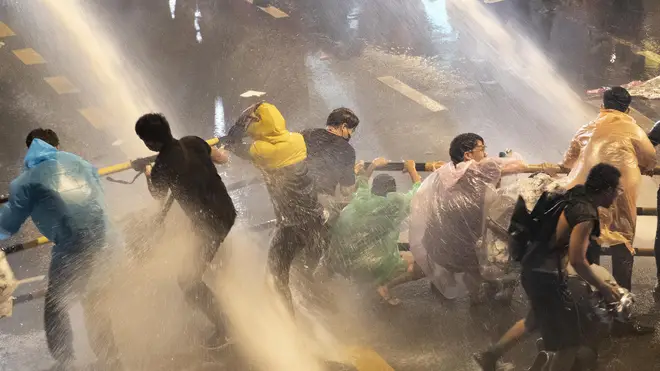
Nick Ferrari 7am - 10am
16 October 2020, 15:04

A state of emergency has been declared in the capital amid protests in which even the royal family has been targeted.
Thailand’s prime minister rejected calls for his resignation, while riot police cracked down on thousands of student-led protesters who rallied in the capital in defiance of a strict state of emergency.
Police used water cannons and charged at the crowd, scattering protesters, onlookers and reporters.
Journalists who were hit by the water said it caused a stinging sensation and was dyed blue, to mark protesters for possible later arrest.
Police appeared to have assumed control of the intersection in Bangkok where the rally was centred, and much of the crowd retreated down a street to nearby Chulalongkorn University, where some organisers advised them to shelter if they were not going directly home.
The protesters had gathered in torrential monsoon rains to push their core demands, including that prime minister Prayuth Chan-ocha leave office, the constitution be amended and the nation’s monarchy undergo reform.

It was the second day they defied an order not to gather, imposed after some demonstrators heckled a royal motorcade, an unprecedented development in Thailand, where the monarchy is normally held in reverence.
Police had earlier closed roads and put up barricades around a major Bangkok intersection where some 10,000 protesters defied the new decree on Thursday.
Police in riot gear secured the area, while malls in the normally busy shopping district closed early. Nearby mass transit stations were closed to stop crowds of protesters from getting near the area.
The student protesters, however, simply moved down the street to another large intersection.
Mr Prayuth’s government declared a strict new state of emergency for the capital on Thursday, a day after the heckling of the motorcade.
The state of emergency outlaws public gatherings of more than five people and bans the dissemination of news that is deemed to threaten national security.
It also gives authorities broad powers, including detaining people at length without charge.
A number of protest leaders have already been rounded up since the decree went into effect.
On Friday another two activists were arrested under a law covering violence against the queen for their alleged part in the heckling of the motorcade.

They could face up to life in prison if convicted.
The protest movement was launched in March by university students and its original core demands were new elections, changes in the constitution to make it more democratic, and an end to intimidation of activists.
The protesters charge that Mr Prayuth, who as army commander led a 2014 coup that toppled an elected government, was returned to power unfairly in last year’s general election because laws had been changed to favour a pro-military party.
But the movement took a stunning turn in August, when students at a rally aired unprecedented criticism of the monarchy and issued calls for its reform.
Using direct language normally expressed in whispers if at all, the speakers criticised the king’s wealth, his influence and that he spends much of his time outside the country.
Thailand’s royal family has long been considered sacrosanct and a pillar of Thai identity.
King Maha Vajiralongkorn and other key member of the royal family are protected by a lese majeste law that has regularly been used to silence critics who risk up to 15 years in prison if deemed to have insulted the institution.
Conservative royalist Thais accuse the protest movement of seeking to end the monarchy, an allegation its leaders deny.
Wednesday’s incident with the royal motorcade was stunned many Thais.

Video that circulated widely showed members of a small crowd heckling a motorcade carrying Queen Suthida and Prince Dipangkorn as it slowly passed.
Security personnel stood between the vehicles and the crowd and there was no visible violence and none was described by witnesses.
It normal in Thailand for those waiting for a royal motorcade to sit on the ground or prostrate themselves.
Mr Prayuth’s declaration of a state of emergency said the measure was necessary because “certain groups of perpetrators intended to instigate an untoward incident and movement in the Bangkok area by way of various methods and via different channels, including causing obstruction to the royal motorcade”.
Mr Prayuth said on Friday that he had no plans to resign as he had done nothing wrong.